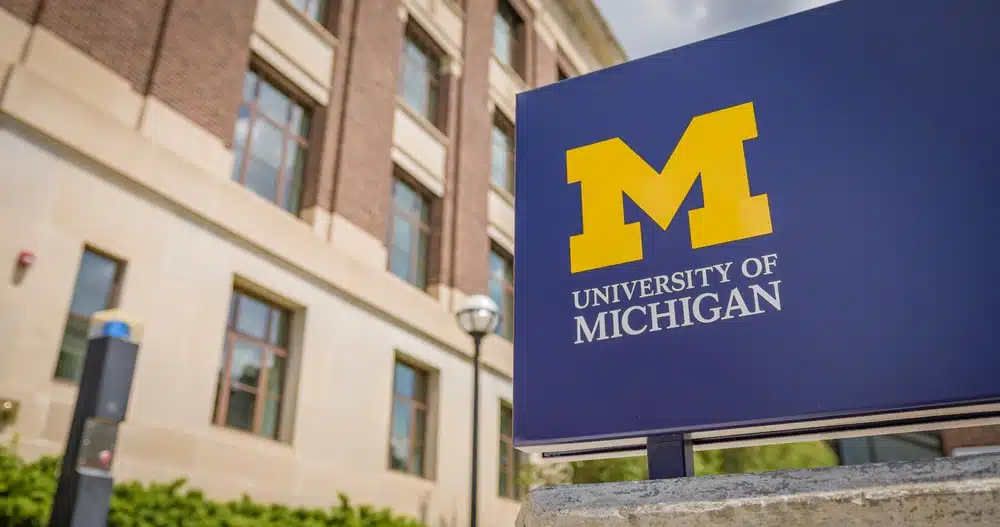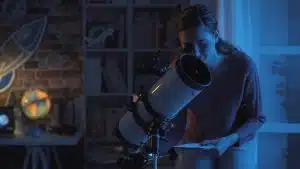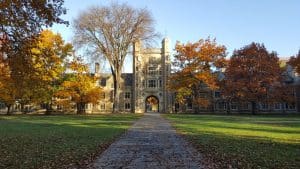Dive Into the World of Advanced STEM: The Michigan Math & Science Scholars (MMSS)
In an era where STEM fields are not just the frontier of progress but the bedrock of our evolving world, programs like the Michigan Math & Science Scholars (MMSS) have become more crucial than ever. For high school students who are contemplating their future academic endeavors and careers, MMSS offers a glimpse into university-level scholarship and research. Let’s delve into what makes MMSS a beacon of advanced learning and why you might consider being a part of this educational experience.
What is the Michigan Math & Science Scholars (MMSS)?
MMSS is a summer enrichment program hosted by the University of Michigan, designed specifically for high school students with a strong interest in mathematics and science. It is not merely a camp but a hub where curiosity meets rigorous academics, a place where students are encouraged to explore and excel in their chosen subjects. The program features a diverse array of courses in mathematics, science, and technology, all conducted by the University’s distinguished faculty and visiting scholars.
Courses Offered
Art & Music
Art and Mathematics: Tracing the symbiotic relationship between art and mathematics, this course delves into how mathematical concepts shape art and vice versa. You will engage in creative activities like drawing and origami to understand principles such as projection, symmetry, and distortion and explore their application in everything from ancient art to digital imaging.
Mathematics and Music Theory: This course bridges the gap between abstract mathematical theory and the structured beauty of music. By examining group theory, graph theory, and other mathematical structures, you will analyze patterns in music from Bach to modern compositions and even create their own music using mathematical principles. A strong foundation in algebra and basic music reading is recommended.
Astronomy
Climbing the Distance Ladder to the Big Bang: How Astronomers Survey the Universe: Discover how astronomers map the cosmos from our local galaxy to the early universe. Through a blend of theory and hands-on experiences, including using a radio telescope and computer modeling, you will investigate cosmic distances, dark matter, and other profound mysteries. The course is ideal for those with a solid grounding in high-school math and a curiosity about the universe’s vastness.
Hunting for the Dark: Black Holes and Dark Matter in the Milky Way: Step into the enigmatic realms of dark matter and black holes in this course that combines astrophysical theory with practical data analysis.
Engage with the lifecycle of stars and the cosmic structures they become while using a variety of observational techniques to study these dark phenomena. Suited for students proficient in high-school math, eager to explore the universe’s darker secrets through labs and programming.
Biology
Brain and Behavior: Discover the intricate workings of the brain and its impact on behavior. You will dive into neuron functions, the effects of stress and sleep on the body, and how experiences can shape your brain. This course covers everything from basic brain functionality to its response to various factors like hormones and neuropsychiatric disorders, with a special session for student-selected topics in neuroscience.
Dissecting Life: Human Anatomy and Physiology: Through lectures and hands-on lab sessions, including dissections and case studies, students will explore the human body’s structure and function, getting up close with anatomical donors in the University of Michigan’s Medical School Labs.
Human Identification: Forensic Anthropology Methods: This course guides students through the application of forensic anthropology in determining the identity of skeletal remains. This lab-based course covers osteology, the creation of biological profiles, trauma assessment, and recovery techniques, culminating in a mock recovery and analysis of human remains using learned methods.
Chemistry
Catalysis, Solar Energy, and Green Chemical Synthesis: This course delves into the evolution of chemistry and biology through hands-on lab experiences, teaching students to conduct and analyze important chemical reactions, including those using metal complexes and visible light. You will also engage in green chemistry applications such as polymer and photovoltaic device creation, complemented by dynamic demonstrations.
Organic Chemistry 101: Orgo Boot Camp: This intensive course introduces the foundational elements of organic chemistry through a mix of lectures, small group activities, and problem-solving, covering structural organization, stereochemistry, and fundamental reactions, with a focus on mechanisms. Laboratory exercises and analytical techniques like infrared spectroscopy and NMR will be incorporated to enhance the learning experience.
Surface Chemistry: This course breaks down into applications, properties, and analytical techniques of surfaces, exploring their role from biological interactions to technological applications, including anti-biofouling and high-temperature resistance. It covers basic surface properties and advanced in situ analysis methods, aiming to spark interest in surface science through multimedia lectures and lab observations.
Sustainable Polymers: This course tackles the future of polymer science, focusing on sustainable, biodegradable materials. You will actively engage in making and testing renewable plastics, studying their properties, degradation, and applications in energy and environmental cleanup while learning to communicate their science through stop-motion animation projects.
Mathematics
An Introduction to Cryptography: This course will discuss the evolution of cryptography, studying a range of techniques and the math behind them, including combinatorics and number theory. This interactive course utilizes group activities and computer labs for cipher analysis.
Art and Mathematics: Discover the interplay between art and mathematics, exploring how mathematical principles like symmetry and projection influence and analyze art. Through hands-on activities like origami, this course examines artistic creation and mathematical concepts in tandem.
Graph Theory: Embark on an exploration of Graph Theory, learning about the fundamental properties and latest discoveries in the field through various interactive activities, including algorithm design and mathematical proofs.
Hex and the 4 Cs: Investigate the connection between a crumpled homework assignment and a cup of coffee to fundamental mathematical concepts of continuity, completeness, compactness, and connectedness, culminating in the Brouwer fixed-point theorem.
Mathematics and Music Theory: This course links mathematical patterns to musical structures, spanning from Bach to modern composers. You will use algebra and music reading skills to compose music, explore tuning theories, and understand the physics of sound.
Mathematics and the Internet: Understand the mathematics behind the Internet’s functioning, covering topics like probability, group theory, and number theory, and apply these to the Internet through coding theory, cryptography, and even building primitive computers.
Mathematics of Decisions, Elections, and Games: Learn how mathematical theories like utility theory and game theory can model decisions and elections, providing insights into individual preferences and collective choices and exploring the implications of Nobel Prize-winning theories.
Physics
Physics Forensic Physics: Discover how physics principles can solve real-world mysteries in forensic science. Through hands-on lab work, you will apply molecular, atomic, and nuclear techniques to analyze evidence, authenticate artifacts, and investigate crime scenes.
From Nuclei to Particles: Physics at the Smallest Scales: Explore the fundamentals of nuclear and particle physics, delving into how the universe and its elemental forces function. Engage with topics like nuclear stability, particle interactions and utilize advanced tools to study phenomena at the smallest scales.
Relativity: A Journey through Warped Space and Time: Dive into Einstein’s revolutionary relativity theories, which challenge our everyday notions of space and time. Examine the nature of black holes and the workings of GPS systems, using advanced mathematics to understand the universe’s warped spacetime fabric.
The Physics of Magic and the Magic of Physics: Merge the worlds of magic and physics as you learn the secrets behind classic magic tricks and the natural phenomena they mimic. Perform experiments to reveal the ‘magic’ of physics, visiting cutting-edge labs to witness the latest physics research firsthand.
Psychology
Brain and Behavior: In this course, you’ll delve into how your brain shapes your actions and thoughts, exploring the science behind neurons, brain functionality, and the impact of factors like stress, sleep, and exercise on the brain. You will also tackle complex topics such as the influence of hormones and neuropsychiatric disorders on behavior, leaving room for student-curated discussions on behavioral neuroscience.
Science of Happiness: Discover the principles of positive psychology and learn what contributes to happiness and life satisfaction. You will focus on the power of positive experiences, traits, and relationships, and how gratitude, optimism, and social connections can enhance well-being. Engage with this science through lectures, discussions, and interactive content, with an opportunity to explore student-selected topics on happiness.
Why should you go to the Michigan Math & Science Scholars (MMSS)?
This is the opportunity to immerse yourself in subjects that fascinate you, guided by some of the leading educators and researchers in their fields. Attending MMSS is an experience that can shape your academic trajectory. The program offers a taste of college life, helps you build a network with like-minded peers, and enhances your problem-solving and critical-thinking skills. It’s an investment in your future as a STEM leader.
Joining the MMSS program serves as a crucial bridge that transports the ambitious high school learner into the realm of collegiate academia. At the University of Michigan, participants gain access to top-tier laboratories, lecture halls, and cutting-edge technologies, all while under the tutelage of the university’s esteemed faculty, graduate scholars, and seasoned undergraduate mentors. The program offers a window into the dynamic world of mathematical and scientific research, providing participants with up-to-the-minute knowledge and discoveries.
Immerse in hands-on experiences in research and computer labs, as well as engage in practical fieldwork alongside their instructors. You will be exposed to the plethora of extraordinary professional avenues that mathematics and science have to offer, available to all who possess an eagerness for knowledge. As you absorb vital insights and knowledge, you will be empowered to navigate and choose your future paths within the scientific arena.
How do you get into the Michigan Math & Science Scholars (MMSS)?
Admission to MMSS is competitive, seeking students who are not only academically strong but also show a genuine enthusiasm for the STEM fields. Applicants must have finished at least their freshman year in high school, defined as grades 9 through 12, and must not have concluded their senior year.
The selection process evaluates your academic records, teacher recommendations, and your personal statement, which should reflect your passion for math and science. Excelling in related coursework and engaging in extracurricular STEM activities will bolster your application.
Essential Instructions for MMSS Application Process
Academic Level Requirements
You must have successfully completed at least one year of high school education and not yet have finished your senior year before the start of the program.
Course Pre-requisites
While a deep reservoir of knowledge in a subject area is not a mandatory requirement for most of the MMSS courses, it is recommended that students align their course choices with their areas of interest to maximize their experience.
Citizenship Criteria
The MMSS program welcomes applications from young scholars all around the globe. Their mission is to cultivate a globally diverse educational environment. Students from any and all backgrounds are invited to apply and enrich the MMSS community with their unique perspectives.
Program Costs
Let’s get into the financial details for the upcoming MMSS sessions, where engaging learning experiences await you.
Mandatory Expenses
- Application Fee: $100 (non-refundable)
- Tuition: $1,300
- Residential Stay: $1,000 (This covers your accommodation, linens, oversight, and all meals)
Note: The application fee is a one-time cost and does not count toward tuition or residential fees.
The tuition fees for all students include:
- A two-week academic endeavor at the University of Michigan
- All necessary course materials
- Instruction from Ph.D. level faculty
- Practical implementation of academic knowledge into real-world situations
For residential scholars, the housing fee also provides:
- A two-week residence at U of M’s campus in Ann Arbor
- Three square meals a day (with breakfast being the only meal on the final Friday)
- Access to a variety of facilities such as game rooms, lounges, laundry services, and outdoor sports areas
- Use of athletic and recreational gear
- Gender-specific community bathrooms with gender-inclusive options available
Optional Expenses:
- Saturday Excursion: $75
- Sunday Outing: $50
- Round-Trip Airport Transfer: $50
- One-Way Airport Transfer: $25
- Additional Dorm Stay: $100 (per night)
- Commuter Lunch Package: $115 (for 9 days)
Budgeting for Extras
You might also consider setting aside funds for:
- Weekday and weekend activities curated by counselors (like bowling or movie nights)
- University of Michigan merchandise and memorabilia
- Snacks or any supplementary meals outside those provided
- Last-minute personal items you might need
MMSS encourages commuter students to join in the weekend activities to bond with their peers. All such engagements can be paid for via the online system or by check.
How to apply to the Michigan Math & Science Scholars (MMSS)?
To apply to MMSS, you must prepare a well-rounded application package. This typically includes your high school transcript, standardized test scores (if available), recommendation letters from teachers (usually STEM teachers), and a personal statement.
The application process is conducted online through the University of Michigan’s dedicated MMSS portal. Ensure that you carefully follow all the instructions and check that each component of your application is completed to the highest standard before submission.
Application Checklist
To render your application complete and ready for review, ensure the following items are submitted:
- An up-to-date transcript (an unofficial copy or a standard grade report will suffice)
- A recommendation letter (you’ll need the email address of your recommender; they’ll receive detailed submission instructions via email)
- A personal statement should be included in your application form, highlighting your academic coursework, any extracurricular influences, computer proficiency, and specific research areas that spur your interest in MMSS, along with any additional information pertinent to your application.
- A $100 Application Fee, which is non-refundable and is not credited towards your account balance even upon admission.
Academic Records
Submission of your current high school transcript or grade report is required; however, your GPA and SAT/ACT scores are not prerequisites for your MMSS application.
Application Timing and Admission Chances
While MMSS admits students on a rolling basis, filling spots as suitable candidates are identified, applying early can be advantageous for course availability but does not serve as a guarantee for admission.
How hard is it to get into the Michigan Math & Science Scholars (MMSS)?
The competitiveness of the MMSS program reflects its prestige. Many applicants from across the globe vie for a limited number of spots each year. While exact acceptance rates may vary, it’s known to be selective.
To maximize your chances of acceptance, you should demonstrate strong academic performance, especially in math and science courses, and show an evident passion for these subjects in your application.
When is the deadline to apply to the Michigan Math & Science Scholars (MMSS)?
The deadlines can vary from year to year, so it is crucial to check the official MMSS website or contact the program administrators directly for updated information. Remember, early preparation and timely submission of your application are key.
When do I find out about my application to the Michigan Math & Science Scholars (MMSS)?
MMSS maintains a selective admissions process, accepting about 50% of those who apply. Not every applicant gains entry into the program, which is why we require a personal statement, a letter of recommendation, and a transcript for a comprehensive evaluation.
Please be aware that applications are only considered once they are fully complete—this includes the submission of all necessary documents, fees, and, for those seeking financial assistance, the relevant tax information. Students who earn a place in the MMSS summer program will be promptly informed, typically within 4 to 6 weeks after their application is complete, via an email sent directly to the email address provided by the student.
Where is the Michigan Math & Science Scholars (MMSS)?
Students attending MMSS as residents will be housed in the University of Michigan’s dormitories, conveniently located within walking distance of the main campus and classroom buildings, with meals included.
Students choosing the Residential option will stay at West Quad (541 Thompson St); student meals will be provided at the adjacent South Quad Dining Hall. All MMSS classrooms are within ten minutes walking distance.
To ensure the safety and well-being of participants, MMSS assigns residential advisors to live in the dorms alongside the students. Mandatory check-ins with these advisors occur regularly in the evenings.
All after-class activities, which involve smaller groups of students, are conducted under the guidance of a supervisory advisor. This supervision extends to the weekend excursions as well. For those opting out of these trips, a variety of monitored events and activities are available in and around Ann Arbor.
Students arriving by plane can be greeted by MMSS administrative personnel at the baggage claim area of Detroit Metro Airport (DTW – airport code), where they will be escorted to the campus via University vehicles.
Similarly, at the conclusion of the program, staff will be available to assist your student with their return journey to the airport. The service for airport shuttles is priced at $50 for a round trip.
When does the Michigan Math & Science Scholars (MMSS) take place?
The schedule for MMSS 2024 is as follows:
Courses will run Monday- Friday, 9-4:30
Session 1: Monday, June 24 – Friday, July 5
Session 2: Monday, July 8 – Friday, July 19
Session 3: Monday, July 22 – Friday, August 2
How long is the Michigan Math & Science Scholars (MMSS)?
You can choose from one to three two-week sessions, each with a distinct course, running from 9:00 a.m. to 4:30 p.m. on weekdays, with a lunch intermission from 12:00 to 1:30 p.m.
Each session of the MMSS program offers an intense and focused academic period that balances instruction, collaborative projects, and independent research.
Typical Day at MMSS Program
Schedule for Residential Students
Morning
7:00 am – 8:45 am: Breakfast at South Quad Dining Hall
9:00 am – 12:00 pm: Morning class session
Midday
12:00 pm – 1:30 pm: Midday meal at South Quad Dining Hall
1:30 pm – 4:30 pm: Afternoon class session
Evening
4:45 pm: Required check-in with counselors at West Quad
5:00 pm – 7:00 pm: Dinner at South Quad Dining Hall
7:00 pm – 10:45 pm: Leisure period with optional camp activities available
10:45 pm – 11:00 pm: Dormitory final checks
Schedule for Commuter Students
Morning to Afternoon
9:00 am – 12:00 pm: Class
12:00 pm – 1:30 pm: Lunch (Included with Commuter Lunch Pass)
1:30 pm – 4:30 pm: Class
4:30 pm: Pick-up time for students outside the classroom building
For lunch, all Commuter Students will converge with Residential Students at the South Quad Dining Hall on campus, integrating fully into the camp’s community during their two-week experience.
Through Michigan Math & Science Scholars (MMSS) dynamic courses, hands-on learning opportunities, and exposure to cutting-edge research, this program empowers students to delve deeply into the wonders of math and science.
It is truly a transformative experience that challenges young minds, expands horizons, and ignites a lifelong passion for discovery. Whether you dream of unraveling the mysteries of the quantum realm, engineering the future of technology, or tackling the grand challenges of modern biology, MMSS offers the tools, community, and inspiration to turn those aspirations into reality. As the program continues to grow and evolve, its commitment to excellence remains unwavering, assuring that the future of science and mathematics is in brilliant hands.
Looking for expert advice on pre-college program applications? AdmissionSight offers years of experience in guiding students toward securing spots in prestigious universities worldwide. Take the first step towards your educational goals – schedule a consultation with us now and begin your journey to academic success!































































